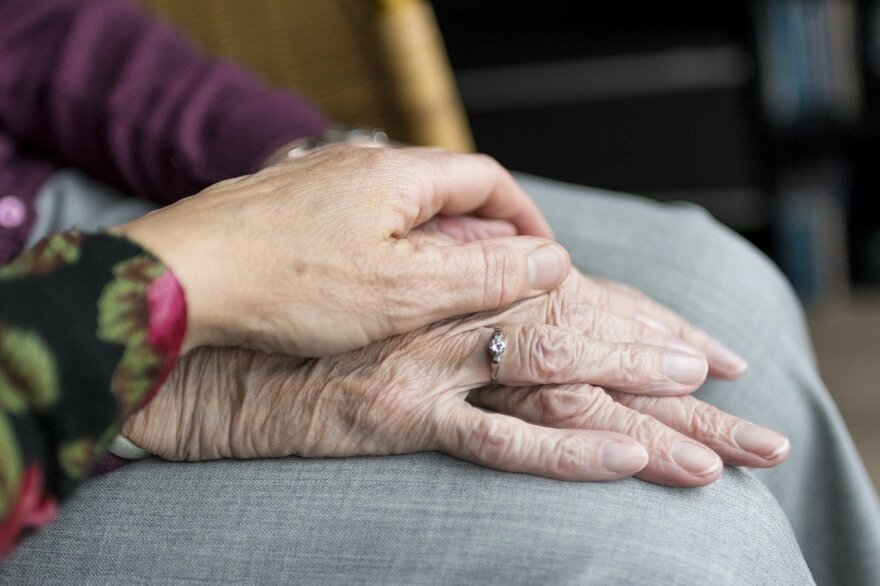Death is an inevitable part of life. But that doesn’t mean that the process is easy or devoid of fear and sadness. Luckily, there are folks out there to help.
Acknowledging and breaking through the discomfort around death are among the many skills of a death doula. Death doulas also help with logistical, physical and spiritual questions raised by the dying and their loved ones.
Host Anita Rao talks with two folks who provide death care about how they assist people in carrying out wishes for the end of their lives. Vivette Jeffries-Logan is a citizen of the Occaneechi Band of the Saponi Nation and a person who holds healing space for those processing death and dying. She is also a founding partner of biwa| Emergent Equity, an equity, leadership, and organizational development consulting firm. And Angela Zimmer is a death doula based in Charlotte.
Rao also talks with end-of-life doula Dr. Aditi Sethi-Brown and her client, Sara Jenkins, about the relationship that’s formed between them after Sara reached out to prepare for the end of her life. Dr. Sethi-Brown is also a hospice physician, musician and co-founder of the Center for Conscious Living and Dying. Jenkins is a writer and editor living in North Carolina.
Dr. Sethi-Brown invites anyone interested to reach out to her at: aditisethimd@gmail.com
Special thanks to everyone who contributed insights to this episode:
Dana Brinson, death doula in the Triangle area, NC
Lupe Tejada Diaz, death doula in the Pacific Northwest (@doula_damn_thing)
Lashanna Williams, death doula in the Pacific Northwest (@thegoodwitchofcascadia)
Omisade Burney-Scott, social justice advocate and storyteller in NC
Interview Highlights:
Vivette Jeffries-Logan on how physical touch helps those in the dying process:
It's to let them know that they're not alone. Because when they're in that liminal space, they're not aware, right, they’re not. And especially the bottom of the feet, to rub the bottom of the feet. What that does is break the earthly connection. So just to let them know that it's okay to go. And you're not alone. And that I'm not afraid or repulsed of the body of someone who is transitioning. I'm not afraid of that.
Angela Zimmer on how she talks to people about their beliefs of what comes after death:
So much of what I do is just listening to what people have to say. This is their experience — this isn't my experience. And a lot of times, with active listening, you can kind of reflect back what people are telling you. And a lot of times just when they hear what they're saying, it kind of helps them figure out what they think about this next thing. Because we don't know what happens after we die. Everybody might have a different idea, and nobody knows for sure.
Holding space for people who need to process their fears or their concerns around death has allowed me to create space for my own self to process.Omisade Burney-Scott
Sara Jenkins on how she’s reflecting on her life as part of her end-of-life preparation:
The most satisfying thing I did was to read through all the journals I had kept for many, many decades. And what a wonderful life I've had! And when I found passages about people that I thought they would enjoy, I would copy them out and send them to them. Even people that I, you know, hadn't been in touch with in a long time. And then that kind of spurred me to reconnect with people that were important to me, and to tell people how much I enjoy them. And to share our past, especially with people who are as old as I am ... it's very meaningful.
Dr. Aditi Sethi-Brown on her role as an end-of-life doula in Sara’s life:
There's no checklist, there's no agenda when I go visit with her. It's really just a matter of exploring what's coming up for her as she's experiencing physical symptoms and reflecting on her life and preparing for her future death. … And as she shares stories and intentions, it's my work to help crystallize and materialize those possibilities and make them reality.
I started working in death care when I was 22. … Over the years, with hard work and support from my incredible allies, I’ve managed to earn the trust and respect of my community. And I’m really grateful for that.Lupe Tejada Diaz, @doula_damn_thing
Please note: This conversation originally aired September 10, 2021.
Copyright 2022 North Carolina Public Radio. To see more, visit North Carolina Public Radio. 9(MDAzNzE4NjE2MDEyNDcxNzIzNTk2MDZlOQ004))



